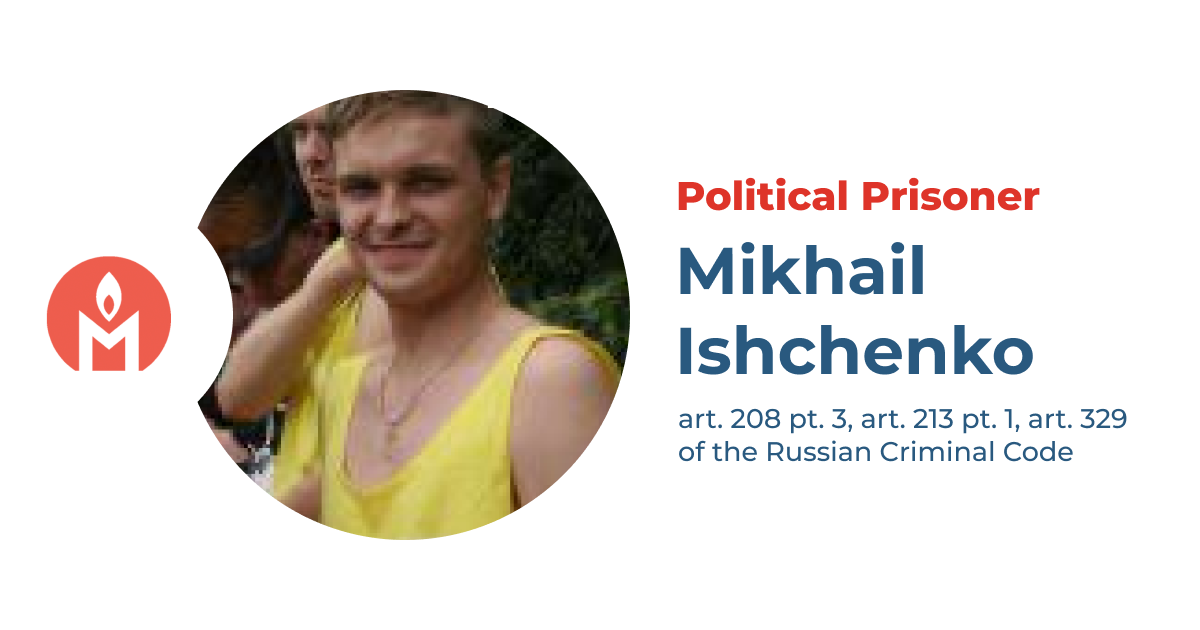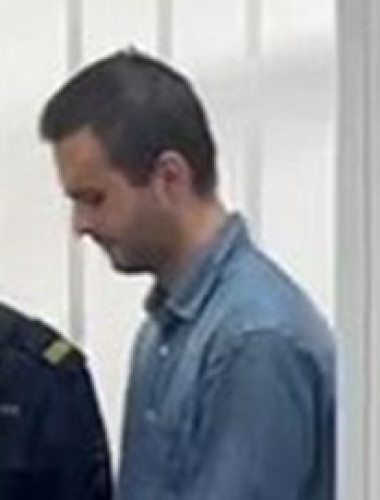Mikhail Ishchenko is a political prisoner
A warehouse worker has been sentenced to 10 years in a strict regime penal colony for setting fire to the Russian flag and intending to join the Russian Volunteer Corps
The ‘Political Prisoners. Memorial’ human rights project, in accordance with international standards, considers Mikhail Ishchenko a political prisoner. He was convicted of desecrating the Russian national flag and politically motivated hooliganism for setting fire to a flag; he was also convicted of preparing to participate in military action on the territory of a foreign state for purposes contrary to the interests of the Russian Federation, after law enforcement officers allegedly found correspondence on his phone indicating his intention to join the Russian Volunteer Corps. Ishchenko’s criminal prosecution and conviction violated his right to a fair trial. We demand that Mikhail Ishchenko be released immediately and that all criminal charges against him be dropped.

What were the charges against Mikhail Ishchenko?
Mikhail Ishchenko, from Kaluga Oblast, worked in a warehouse in Moscow Oblast. On 24 September 2023, he set fire to a Russian flag at the entrance to the Rodina sports complex in Khimki. He was detained on 26 September and remanded in custody the same day.
Ishchenko was initially prosecuted on a charge of hooliganism motivated by political and ideological hatred (Article 213, Part 1, of the Russian Criminal Code). The same actions were subsequently also classified as desecration of the Russian state flag (Article 329).
According to the law enforcement authorities, correspondence with a Telegram bot of the Russian Volunteer Corps was discovered on Ishchenko’s phone in which Ishchenko allegedly expressed a desire to join that organisation. This led to a further charge of preparing to participate in military action on the territory of a foreign state for purposes contrary to Russian interests (Article 30, Part 1, in conjunction with Article 208, Part 3).
On 26 June 2024, a court in Khimki sentenced Mikhail Ishchenko to 10 years’ imprisonment with the first two years to be served in a cell-type prison and the remainder in a strict regime penal colony.
Why do we consider Mikhail Ishchenko a political prisoner?
Even if Mikhail Ishchenko did indeed intend to join the Russian Volunteer Corps to participate in military action on the side of Ukraine, his actions would not constitute a crime. Resisting aggression as a member of the Ukrainian armed forces does not contradict Russia’s interests: it is Russia’s criminal war launched by the Russian authorities against Ukraine that does.
The severity of the sentence imposed on Ishchenko for setting fire to the flag is grossly disproportionate to the social danger of his actions. Furthermore, he has been prosecuted on two separate criminal charges (desecration of the national flag and hooliganism) for a single act, which is both excessive and unlawful.
The current version of the article of the Russian Criminal Code on hooliganism contradicts the principle of legal certainty. It is not possible to know in advance which actions might be grounds for prosecution. Moreover, the attribution of a motive of political hatred to defendants in such cases allows the courts to impose significantly harsher punishments.
A detailed description of Mikhail Ishchenko’s case and of our position is available on our website.
Recognition of an individual as a political prisoner does not imply the ‘Political Prisoners. Memorial’ human rights project agrees with, or approves, their views, statements, or actions.
How can you help?
If you have information about the location of Mikhail Ishchenko, please contact our Telegram bot or email us at [email protected]
You can donate to help all political prisoners in Russia.
